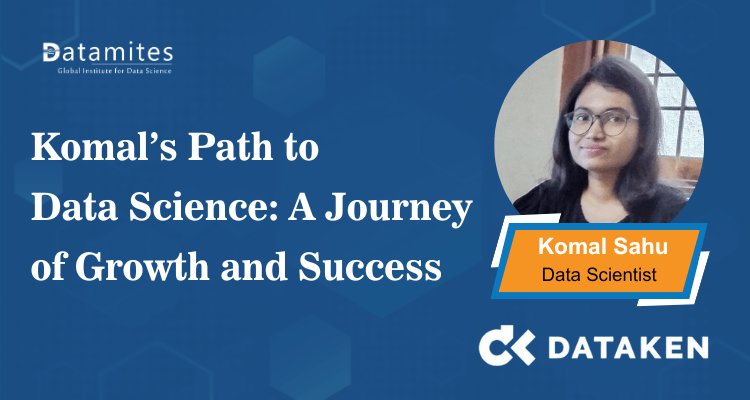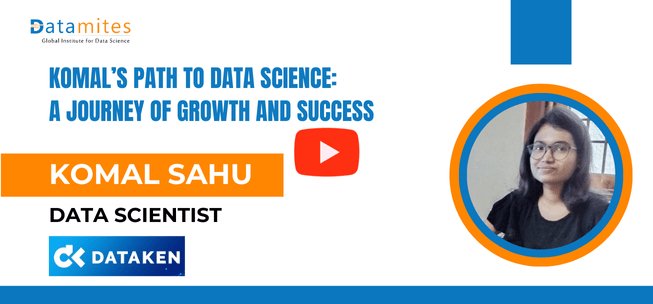Komal’s Path to Data Science: A Journey of Growth and Success
Komal's journey into data science highlights her growth through determination, practical learning, and mentorship. Her story showcases the path to success in the dynamic field of data science.

Starting a career in data science is both thrilling and demanding. As the demand for skilled data scientists continues to grow, more individuals are choosing to transition into this dynamic field. The road to becoming a data scientist, however, is not always straightforward. From mastering technical skills like Python and machine learning to facing the realities of job interviews and internship requirements, the journey requires persistence, continuous learning, and guidance.
In a recent session with a successful DataMites graduate, Komal Sahu shared valuable insights into the process of becoming a data scientist. Komal’s story not only offers a glimpse into the technical aspects of the course but also highlights the importance of resilience during the job search phase. In this blog, we’ll break down key takeaways from the interview, answer common questions, and provide actionable advice for anyone considering a career in data science.
How Komal Transformed Her Career with DataMites into Data Science
Komal's journey from a different field to data science is a testament to her determination, adaptability, and the power of guided learning through DataMites.
Q1: What were your professional backgrounds before data science?
I completed my B.Tech in Electronics and Communication. I was preparing for competitive technical exams before learning about data science through a senior who had made a successful transition.I decided to take the plunge and enrolled in DataMites Institute to build a career in Data Science.
Q2: Did you have prior programming experience?
Yes, I had experience with programming languages, I had studied C and C++ during college. Python was new, but I picked it up during the course and followed the mentor’s guidance strictly.
Q3: How did you approach statistics and SQL, and was it difficult?
I had a basic understanding of statistics from math, but I learned the specific concepts needed for data science. It wasn’t very difficult, thanks to the focused teaching style.
Q4: What was the most important part of your learning journey?
For me, projects were everything. They helped make my resume stronger and gave me the confidence to handle interviews. I even uploaded my projects on GitHub for future employers to see.
Q5: What helped you stand out in interviews?
Being able to clearly talk about my projects and demonstrate them through my GitHub profile really helped me stand out in interviews.
Q6: How many interviews did you attend before landing your job?
I gave three interviews — with Crown Labs, Cogvision, and one SQL-based interview — before getting placed with Dataken Technologies through DataMites.
Q7: What kind of interview questions did you face?
I faced questions on machine learning algorithms, hyperparameters, AI trends, and project-specific topics. They also tested basic Python skills with coding challenges like list/dictionary manipulation and sorting.
Q8: Did you explore job opportunities beyond the placement support provided by DataMites?
I did try applying on LinkedIn and Naukri, but I didn’t receive calls. All the interviews I attended came through DataMites.
Q9: How important is GitHub in the job search process?
GitHub is extremely important. Recruiters checked my GitHub profile to review my code and projects. It became a proof point of my skills and added credibility to my resume.
Q10: What’s your view on the current job market for data science?
Before getting placed, I was nervous because I wasn’t getting interview calls on my own. But DataMites made it happen. I can’t comment much on the broader market trends, but from my experience, DataMites played a huge role
Q11: What inspired you to select DataMites for your data science journey?
I did a lot of research before selecting a course provider. DataMites stood out due to its structured curriculum, experienced mentors, and positive reviews from former students. I liked the fact that they offered both theoretical knowledge and hands-on experience through real-world projects.
Q12: What were the most challenging topics in data science for you?
For me, statistics was initially a bit challenging. Understanding concepts like probability distributions, hypothesis testing, and statistical significance took some time. However, with consistent practice and the help of mentors, I was able to grasp the concepts well.
Q13: How did you overcome these challenges?
I made sure to break down complex topics into simpler sub-topics. Additionally, I used a variety of resources, including textbooks, online tutorials, and discussions with my mentors, to strengthen my understanding. The key was consistency and applying what I learned to projects.
Q14: How did you prepare for interviews in the data science field?
I spent a lot of time preparing for technical interviews, especially focusing on coding challenges and data structures. I also made sure to thoroughly understand the projects I had worked on, as they were a huge part of my interview discussions. Participating in mock interviews and working through practice questions significantly boosted my confidence.
Q15: What kind of interview questions did you face?
Most of the interview questions I faced were related to machine learning algorithms, statistics, and data analysis. I was also asked about my projects, and how I applied various data science techniques. Additionally, coding challenges involving algorithms and data structures were common.
Q16: How did you handle the stress during interviews?
The pressure of interviews was definitely there, but I kept reminding myself that preparation was key. I practiced as much as I could and tried to stay calm during the interviews. I also made sure to clarify my thought process with the interviewer, which helped ease the tension.
Q17: How did DataMites support you in the placement process?
DataMites provided excellent placement support. They helped with mock interviews, resume building, and sharing job opportunities. Their placement team was highly supportive and provided guidance throughout the entire interview process, making sure I was thoroughly prepared at every step.
Q18: How did DataMites support you in the placement process?
DataMites provided excellent placement support. They helped with mock interviews, resume building, and sharing job opportunities. Their placement team was proactive and guided me through the entire interview process, ensuring I was well-prepared
Q19: How long did it take for you to land a job after completing the course?
It took me about 4 to 5 months after completing the course to secure my first job. I attended several interviews, and I think the combination of my solid project work and DataMites’ placement support played a significant role in landing the job.
Q20: What advice would you give to someone looking to start a career in data science?
My advice would be to focus on learning the fundamentals of statistics, programming, and machine learning. Gain hands-on experience by working on real-world projects and enhancing your professional portfolio. Don’t be afraid of failures—every mistake is an opportunity to learn. Also, find a good mentor or join a community where you can seek advice and guidance.
Refer these articles:
- From Beginner to Expert: Sunil Kumar's Data Science Journey
- Harish Kumar's Journey: A Roadmap to Data Science Success
- From Non-Tech to Data Science: Pavan's Career Transition
Insights from Komal Sahu’s Path to a Career in Data Science
Her inspiring journey highlights the power of dedication, practical learning, and guided mentorship in breaking into the data science field.
- Career Shift is Possible: Komal successfully transitioned from a software development background into data science, proving career switches are achievable with the right guidance.
- Python is Manageable for Beginners: With focused learning, Python can be picked up easily, even by those with limited exposure.
- Structured Learning Helps: A well-organized curriculum, like the one offered by DataMites, plays a crucial role in developing both foundational and advanced skills.
- Mentorship Matters: Expert mentorship provided clarity, direction, and confidence throughout Komal’s learning journey.
- Hands-On Projects are Crucial: Real-world projects (like housing price prediction or sentiment analysis) helped bridge the gap between theory and practice.
- GitHub Portfolio is a Must: Showcasing projects on GitHub helped Komal stand out to recruiters and validate their technical skills.
- Team Collaboration Adds Value: Working in project teams built communication skills and reinforced concepts through peer learning.
- Interview Preparation is Key: Mock interviews and technical practice helped Komal feel confident and perform well in real interviews.
- Focused Job Support Accelerates Results: Datamites' placement support directly contributed to Komal landing job interviews and placement.
- Soft Skills Complement Technical Skills: Explaining projects clearly and maintaining composure during interviews were as important as coding skills.
- Statistical Knowledge Can Be Mastered: With proper resources, even challenging topics like statistics become manageable.
- Persistence Pays Off: Despite delays in receiving interview calls from outside sources, Komal stayed committed and eventually got placed.
- GitHub Acts as a Digital Resume: Recruiters actively reviewed GitHub profiles, making it a valuable tool for demonstrating capability.
- Real-World Application Increases Confidence: Solving practical problems through capstone and client-based projects increased Komal’s confidence in interviews.
- Job Market Remains Strong: Despite concerns, data science continues to be a thriving field with strong hiring demand.
- Short-term Setbacks are Normal: Komal experienced some initial job search struggles, showing that patience and consistency are crucial.
- Interview Questions Span Multiple Topics: Common questions included machine learning, Python coding, project details, and statistical methods.
- Clear Learning Focus Works: Komal’s success came from following mentor guidance strictly and focusing only on what's essential for the role.
Refer these articles:
- Why Data Scientist Career in Bangalore
- Why Data Scientist Career in Hyderabad
- Why Data Scientist Career in Kolkata
Komal Sahu’s journey is a powerful example of how determination, the right training, and hands-on experience can lead to a successful career in data science. Despite initial challenges, she built a strong foundation in programming, statistics, and project work, ultimately securing her place in the industry. Her story is an inspiration for anyone looking to break into data science—showing that with focus and persistence, success is absolutely achievable.
If you're considering a transition into data science, now is an excellent time to enhance your skills. As reported by the IMARC Group, the global data science platform market was valued at USD 15.2 billion in 2024 and is expected to surge to USD 144.9 billion by 2033., with a CAGR of 27.08% between 2025 and 2033. This rapid rise is fueled by the explosive increase in digital data across various industries. To stay competitive in this evolving landscape, choosing a training institute that emphasizes hands-on learning, real-time internships, and strong placement support is essential. Consider enrolling in leading data science training in Pune, Bangalore, Hyderabad, Chennai, Mumbai, and Delhi to launch your career on a solid foundation.
DataMites has emerged as a top-tier training provider in Data Science, AI, Machine Learning, Python Development, and Data Analytics. Accredited by IABAC and NASSCOM FutureSkills, DataMites offers expert-led instruction, real-world project exposure, and comprehensive placement support to help learners make a seamless career switch into data science.
With offline data science courses in Bangalore, Hyderabad, Chennai, Pune, Ahmedabad, Coimbatore, and Mumbai — and flexible online learning options, DataMites caters to diverse learner needs. Its practical, industry-aligned training empowers fresh graduates, working professionals, and career changers with the tools to thrive in data-centric roles.
Komal's journey is more than a success story — it’s a guidepost for aspiring data scientists navigating the complexities of this fast-paced domain. Her experience shows that with the right guidance, hands-on projects, and dedication, anyone can enter the tech world, regardless of background.
If you’re wondering whether data science is the right path for you — whether it’s about the curriculum, placement prospects, or your technical readiness — let Komal’s story inspire you: you don’t need to be perfect to begin; you just need to take the first step and stay committed.

